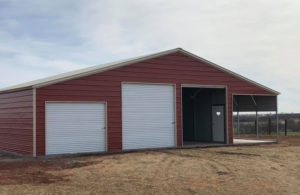
When it comes to housing livestock, the choice of barn material is a significant decision that directly impacts the well-being and productivity of the animals. Metal barns have gained popularity as a practical and efficient option for livestock housing, offering a range of benefits that make them a viable choice for farmers and ranchers.
Durability and Longevity
Metal barns are known for their exceptional durability. They can withstand harsh weather conditions such as heavy rain, snow, and strong winds, providing a sturdy shelter for livestock year-round. This durability translates to a longer lifespan compared to traditional wooden barns, reducing the need for frequent repairs or replacements.
Low Maintenance
Metal barns require minimal maintenance, saving both time and resources. Unlike wood, metal is resistant to pests, rot, and decay. This means no worries about termites or other wood-damaging insects, leading to lower maintenance costs over the years.
Fire Resistance
Metal is non-combustible, making metal barns inherently fire-resistant. This feature is especially important for livestock housing, as it reduces the risk of a devastating fire that could harm both animals and property.
Customization
Metal barns offer a high degree of customization to suit the specific needs of different livestock. Farmers can choose the layout, size, and features that best accommodate their animals and management practices. Whether it’s a spacious dairy barn or a comfortable shelter for horses, metal barns can be designed to meet these requirements.
Improved Air Quality
Proper ventilation is crucial for maintaining good air quality within a livestock facility. Metal barns can be designed with ventilation systems that promote air circulation and prevent the buildup of odors and harmful gasses, contributing to healthier and more comfortable conditions for the animals.
Drawbacks
However, there are a few potential drawbacks to using metal barns for livestock. For example, metal barns can be quite hot in the summer and cold in the winter. This can be a problem for livestock that are not used to extreme temperatures.
Additionally, metal barns can be noisy and cause a lot of echoing. This can be bothersome for livestock owners and their neighbors.
Conclusion
When properly designed and maintained, metal barns can provide a comfortable and secure environment for livestock, contributing to their well-being and the success of the operation as a whole.